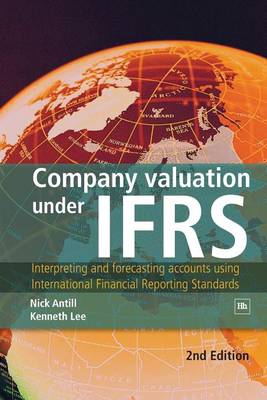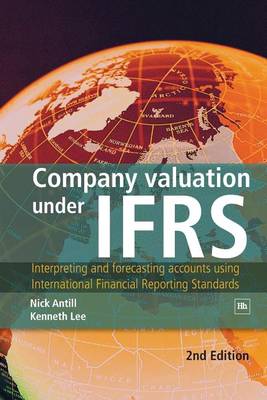
- Afhalen na 1 uur in een winkel met voorraad
- Gratis thuislevering in België vanaf € 30
- Ruim aanbod met 7 miljoen producten
- Afhalen na 1 uur in een winkel met voorraad
- Gratis thuislevering in België vanaf € 30
- Ruim aanbod met 7 miljoen producten
Zoeken
Company Valuation Under Ifrs
Interpreting and Forecasting Accounts Using International Financial Reporting Standards
Nick Antill, Kenneth Lee
Paperback | Engels
€ 90,45
+ 180 punten
Omschrijving
International Financial Reporting Standards (IFRS) are now mandatory in many parts of the world, including Europe, Australia and China. In addition, many countries are in the process of IFRS adoption. Lastly, foreign registrants in US companies no longer have to undertake a costly US-IFRS reconciliation. Therefore, it is clear that investors, analysts and valuers need to understand financial statements produced under IFRS to feed in to their valuations and broader investment decisions. Written by practitioners for practitioners, the book addresses valuation from the viewpoint of the analyst, the investor and the corporate acquirer. It starts with valuation theory: what is to be discounted and at what discount rate? It explains the connection between standard methodologies based on free cash flow and on return on capital. And it emphasizes that, whichever method is used, accurate interpretation of accounting information is critical to the production of sensible valuations. The authors argue that forecasts of cash flows imply views on profits and balance sheets, and that non-cash items contain useful information about future cash flows - so profits matter. The book then addresses the implications for analysis and valuation of key aspects of IFRS including: - Pensions - Stock options - Derivatives - Provisions - Leases The text also sets out which countries use GAAP, as well as the key differences between IFRS and US GAAP treatments of these issues, in addition to their implications for analysis. A detailed case study is used to provide a step-by-step valuation of an industrial company using both free cash flow and economic profit methodologies. The authors then address a range of common valuation problems, including cyclical or immature companies, as well as the specialist accounting and modelling knowledge required for regulated utilities, resource extraction companies, banks, insurance and real estate companies. Accounting for mergers and disposals is first explained and then illustrated with a detailed potential acquisition using real companies.
Specificaties
Betrokkenen
- Auteur(s):
- Uitgeverij:
Inhoud
- Aantal bladzijden:
- 430
- Taal:
- Engels
Eigenschappen
- Productcode (EAN):
- 9780857193681
- Verschijningsdatum:
- 21/10/2013
- Uitvoering:
- Paperback
- Formaat:
- Trade paperback (VS)
- Afmetingen:
- 156 mm x 234 mm
- Gewicht:
- 603 g

Alleen bij Standaard Boekhandel
+ 180 punten op je klantenkaart van Standaard Boekhandel
Beoordelingen
We publiceren alleen reviews die voldoen aan de voorwaarden voor reviews. Bekijk onze voorwaarden voor reviews.








